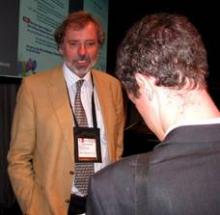Official Recommendations Start Mainstreaming RD
The strikingly successful track record of RD so far led the European Society of Hypertension to last May issue recommendations on using the treatment in routine practice (J. Hypertens. 2012;30:837-41). The Society endorsed routinely treating patients who match the criteria for having dangerously high, treatment-resistant hypertension similar to the criteria that have been used in the Symplicity trials and other recent RD studies.
But investigator-driven research protocols at several European centers are now even moving beyond these criteria, as patients with milder levels of drug-resistant hypertension also clamor for RD.
"We are moving to treat less severe hypertension, but within a clinical study," said Dr. Roland E. Schmieder, professor of medicine and vice chairman of nephrology and hypertension at the University Hospital in Erlangen, Germany. He also stressed that these studies will still continue to exclude patients with impaired renal function at baseline. "Everyone in Germany agrees the focus must be on treatment-resistant hypertension, when physicians feel they have no other choice to offer patients. But as you move into patients with less severe hypertension you increase the need for hard–end-point trials" that are better able to prove an overall net benefit to patients from RD, he said in an interview.
"We have a lot of safety data" for RD, but long-term follow-up is still limited. "We don’t have experience with what happens when [RD-treated] patients become critically ill. They may still need some renal innervation to prevent traumatic shock," he said. "There are still unanswered safety questions, but so far the main concern, renal function, has improved" following RD.
Another caution about treating milder hypertension is that the treatment effect will generally be smaller than what’s seen in patients with more severe hypertension.
But Dr. Schmieder shares the enthusiasm of many of his colleagues who believe they now have an effective new tool for treating hypertension.
"Renal denervation is a very important step forward, because hypertension is killer No. 1 worldwide, and no new antihypertensive drugs are on the horizon," he said. We don’t expect any new antihypertensive drugs for at least the next 10 years. To have this new option is important, both for treating patients and to help increase awareness of the disease."
The Symplicity trials have been sponsored by Ardian, which first developed the Symplicity renal denervation catheter, and by Medtronic, which acquired Ardian and now produces and markets the catheter. Dr. Brady, Dr. Táborský, Mr. Franzen, Dr. Fischer, and Dr. Gonzalez-Juanatey did not have any relevant disclosures. Dr. Böhm, Dr. Esler, Dr. Mahfoud, and Dr. Schmieder said that they have received research, travel, and consultancy funding from Medtronic and Ardian. Dr. Mahfoud said that he has also received research funding from Vessix Vascular and ReCor Medical Technology, companies that are developing other devices for renal denervation.


